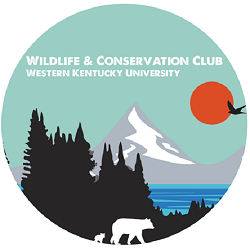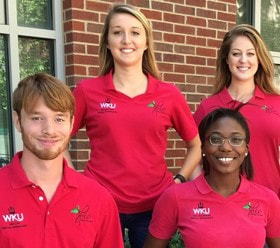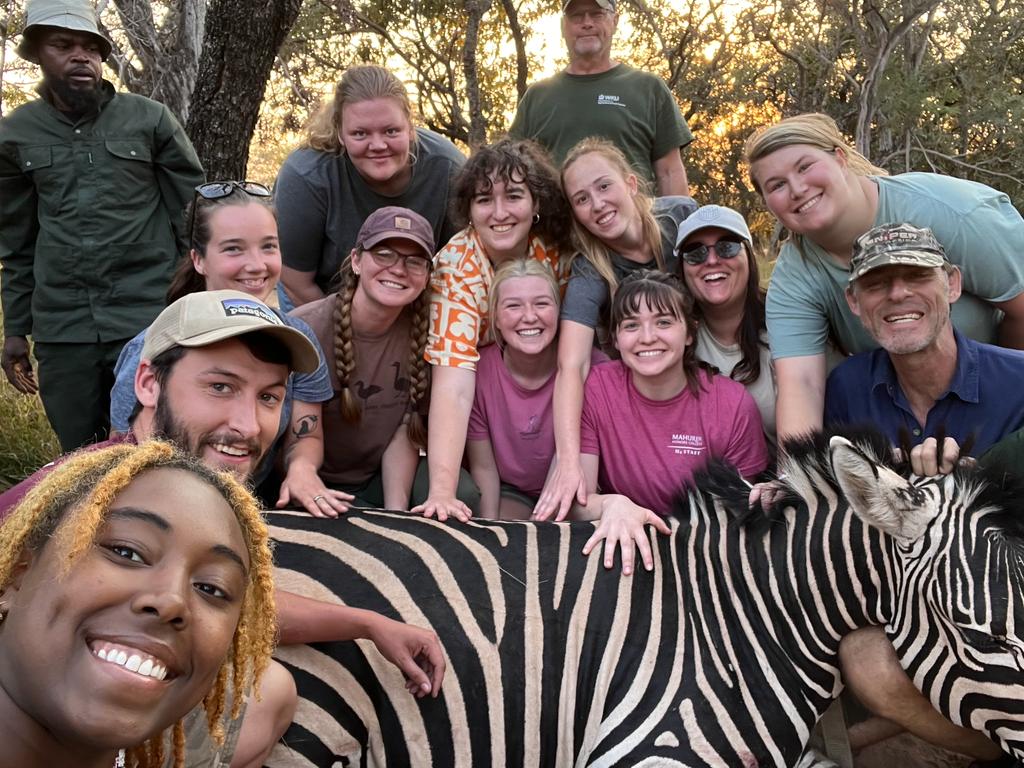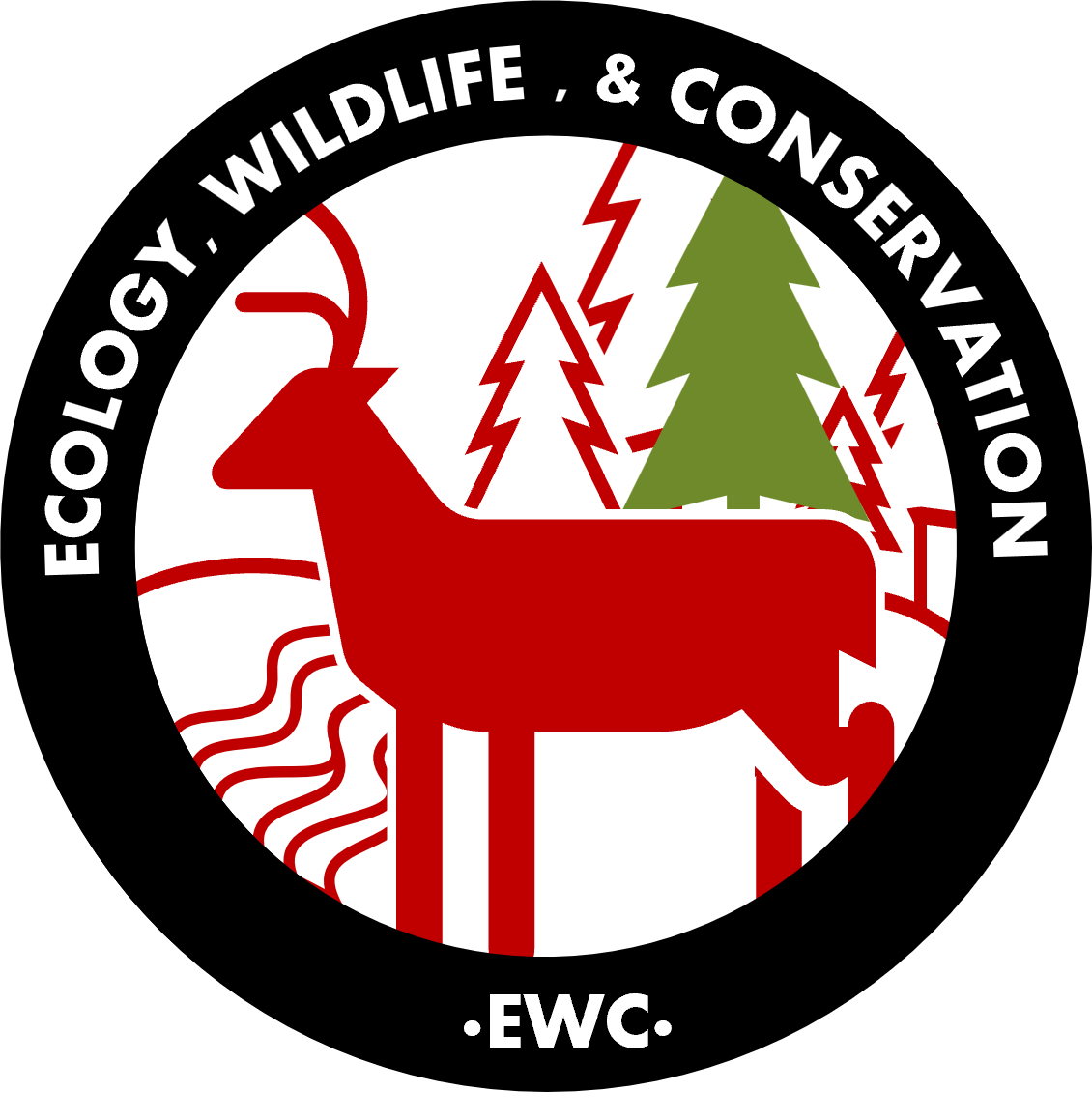Ecology, Wildlife, & Conservation Concentration
Find Your Field in Ecology, Wildlife, & Conservation
- Manage the land quality of forests, parks,rangelands, and other natural resources
- Work for federal, state, and local governments; on privately owned lands; or in social advocacy organizations.
- Typically need a bachelor’s degree in forestry, natural resources, or a related field
- Median annual wage = $64,220-$64,460, seasonal and hourly pay is also common starting out
- Projected to grow 4% over the next 10 years, about as fast as the average
- More labor statistics for this sector...
- Monitor the environment and investigate sources of pollution and contamination
- Work in offices and laboratories, may spend time in the field gathering data and monitoring environmental conditions firsthand
- You will need at least a bachelor’s degree in a natural science or science-related field for most entry-level jobs
- Median annual wage = $76,480, seasonal and hourly pay is also common starting out
- Projected to grow 6% over the next 10 years, faster than average (more info)
- More labor statistics for this sector...
- Study animals, those both in captivity and in the wild, and how they interact with their ecosystems
- Variety of settings, including offices and laboratories, may spend time outdoors, gathering data and studying animals
- Need a bachelor’s degree for entry-level and may need a master’s degree for higher level jobs,
- Median annual wage = $67,430, seasonal and hourly pay is also common starting out
- Projected to grow 3% over the next 10 years, about as fast as the average
- More labor statistics for this sector...

Research Assistant
Field or Lab Assistant
Restoration Technician
Environmental Monitor
Park Naturalist
Environmental Consultant
Docent or intern
Natural Resource Manager
Wildlife Law Enforcement
Wildlife Manager
Public Educator/Outreach
Landscape Designer

State Fish & Game
US Fish & Game
National Parks Service
Bureau of Land Mgt.
Colleges & Universities
NGOs or Non-Profits
Eco-Businesses
Eco-Industries or Labs
Tourism & Recreation
Pest Control Agencies
Animal Welfare Orgs
Rehab Clinics
Bureau of Labor Statistics, U.S. Department of Labor, Occupational Outlook Handbook, Life Science Occupations
Know Your Path in Ecology, Wildlife, & Conservation
Biology & Science Core
Cells, Metabolism, & Genetics + Lab • Ecology, Evolution & Diversity + Lab • Algebra • Biophysics + Lab • Chemistry + Lab • Professional Aspects of Biology
EWC Requirements
Plant Biology & Diversity + Lab or Animal Biology & Diversity + Lab • Ecology • Genetics + Lab • Ecology Lab • Evolution • Biostatistics • Principles of Wildlife Biology or Fisheries Management
EWC Biology Electives
[Students select 3-4 of these courses, based on their own interests, including any from the list above not taken as a requirement. Other choices include the below]
Field Biology • Aquatic Field Ecology • Ichthyology • Herpetology • Mammalogy • Ornithology • Ornithology Lab • Insect Biodiversity • Plant Taxonomy • Animal Behavior • Form/Function • Animal Physiology • Cooperative Education in Biology • Independent Research in Biology
Some jobs in the EWC concentration will require certification, and may require additional courses.
EWC Example Courses
Colonnade courses are required by WKU and each student selects courses of interest outside of their major in various categories. These are relevant to the EWC-track.
Recreation in Society • Environmental Science & Sustainability • Our Dynamic Planet •Environmental Geology • Environmental Resource • Economics Recreation & Tourism • Challenges of a Changing Biosphere • Ethnobiology – Peoples, Plants & Animals • Causes and Consequences of Human-Wildlife Conflict
This concentration has allowances for an added minor or certificate.
These would pair well:
Nonprofit Administration Minor
Outdoor Experience Leadership Minor
Applied Data Analytics, Certificate
Find Your Place in Ecology, Wildlife, & Conservation

The Biology Department has lots of student organizations to chose from. These clubs are great way to make friends, get involved, and enhance your experience in our department! The Ecology and Wildlife Conservation Club is a great option for any student in the EWC degree concentration.

There are many opportunities to participate in research as an undergraduate student in our department, from lab to field work, in streams, forests, or savannahs. Our undergrads regularly contribute to new discoveries! Find an EWC lab that matches your interests!

Study abroad in South Africa with BIO 485 Field Biology African Wildlife Management. It is typically offered during the last 2 weeks of May and the first two weeks of June. This is a skills-based course for students in relevant careers, including veterinary medicine, ecology and wildlife biology.

The Center was established to coordinate, promote and study biodiversity issues in the state and to serve as a resource for information on Kentucky biota, from basic demographic, evolutionary and ecological parameters to the role of biodiversity in the economic development of the Commonwealth.
The Green River Preserve GRP) comprises over 1600 acres of land, and stretches across both banks of the Green River in Hart County, Kentucky. The mission of the WKU Green River Preserve is to foster knowledge and protection of this highly diverse region and our natural heritage through research, education, and conservation.

The mission of the KAS is to catalyze scientific communication and collaboration that will improve research, education, and evidence-based public engagement within the Commonwealth of Kentucky. Select: Membership >> Become a Member >> Join Online Now. On the form, select WKU as your institution and use your WKU e-mail.
An internship is a great way to get hands-on exposure to different disciplines within biology. Internships can helping you decide if your chosen career is right for you! They providing experiential hours required by many professional societies and you can get upper-level biology credit (BIOL 369).

Some EWC jobs require certification.



Biology Ambassadors are an elite group of students who assist with recruitment, retention, and advising. They help prospective students and visitors understand that the Biology Department is truly an exceptional place.

BioCoaches are talented upper division students that serve as peer mentors and learning assistants in our introductory courses. Serving in BIOL 122 is best for EWC students, and you'll receive course credit for playing a vital role in student success.
Some of the links on this page may require additional software to view.



